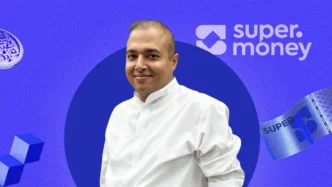Super.money, the financial service spin-off from Flipkart, has quietly entered a new phase of expansion by teaming up with payments infrastructure company Juspay. The partnership is expected to accelerate Super.money’s push into the direct-to-consumer checkout space as the platform targets $100 million in annual revenue by 2026.
The timing is crucial for both sides. Juspay has been working to recover its footing after a turbulent year marked by tensions with major payment gateways. The collaboration gives both companies a chance to rebuild momentum and expand their reach in India’s highly competitive fintech landscape.
Last week, Super.money introduced its new checkout solution called Super.money Breeze, designed to deliver a seamless one-click checkout experience. The product aims to simplify online shopping by removing repetitive logins and one-time passwords, helping merchants speed up customer transactions. Although the company hasn’t publicly named its technology partners, industry insiders confirm that Juspay is powering the payments infrastructure behind this new offering.
For Super.money, the partnership signals an important move beyond Flipkart’s user base. By connecting directly with D2C brands, the company is positioning itself as an independent player in the wider e-commerce ecosystem. The goal is clear: to make Super.money a recognizable name among India’s fast-growing online shoppers while deepening its consumer payment ecosystem.
For Juspay, the collaboration represents a vital opportunity to regain ground. Earlier this year, the company lost several major clients after payment processors such as Razorpay and Cashfree Payments shifted to their own in-house systems. The fallout impacted Juspay’s fundraising efforts, with its most recent round coming in at $60 million — significantly lower than earlier expectations. Even so, Juspay remains a trusted partner for large companies like Amazon and continues to hold a payment aggregator license from the Reserve Bank of India. Its expertise in optimizing transaction routing gives Super.money a ready-made foundation for scale without having to build full-stack payments capabilities from scratch.
Super.money launched in June 2024, roughly a year after Flipkart separated from PhonePe. Since then, it has grown rapidly to become one of India’s top five UPI (Unified Payments Interface) apps by transaction volume. According to the National Payments Corporation of India, the app handled over 200 million transactions per month through August, outperforming several established banks and fintech platforms.
The company’s next big milestone is credit. Super.money is already one of India’s leading issuers of secured credit cards, capturing about 10% of the market through a partnership with Utkarsh Small Finance Bank. These cards, which require a refundable deposit, have become a key part of the platform’s monetization strategy. Super.money has issued around 300,000 cards so far and is adding nearly 50,000 each month. Talks are also underway with another private-sector lender to further scale distribution.
By blending UPI payments with higher-margin products such as credit cards and consumer loans, Super.money is steadily building a path toward profitability. Unlike many rivals, the company has maintained a lean operation, employing fewer than 150 people while serving a base of more than 80 million users. Its low marketing spend and dependence on Flipkart’s existing distribution channels have helped keep costs under control.
The company’s pragmatic approach appears to be paying off. Flipkart has invested $50 million into Super.money since its launch, led by Prakash Sikaria, a former Flipkart executive who oversaw customer growth and new initiatives such as Shopsy, Cleartrip, and SuperCoins. With strong backing and early traction, Super.money is now looking beyond Flipkart. It plans to raise external capital at a valuation of about $1 billion next year, aiming to boost growth in credit products, lending, and D2C checkout solutions.
For Flipkart, the platform represents a renewed push into financial services after it spun off PhonePe in 2023. While PhonePe now operates independently, Super.money remains closely tied to Flipkart — giving the retailer a second chance to dominate India’s fast-evolving fintech sector.
The company is projected to close 2025 with $30 million in annual recurring revenue, with plans to more than triple that figure by 2026. The key growth engines will be secured credit cards, personal lending, and its expanding checkout infrastructure powered by Juspay.
However, Super.money still faces an uphill battle. Giants like Google Pay, PhonePe, and Razorpay continue to fortify their ecosystems with deeper integrations and proprietary payment stacks. To stand out, Super.money must prove that it can transform UPI scale into long-term, sustainable revenue — something only a few players in India’s fintech space have managed to do.
The next 12 months will be pivotal. If Super.money can maintain its momentum while expanding its merchant partnerships and credit portfolio, it could very well become Flipkart’s next major fintech success story — and a comeback catalyst for Juspay.













